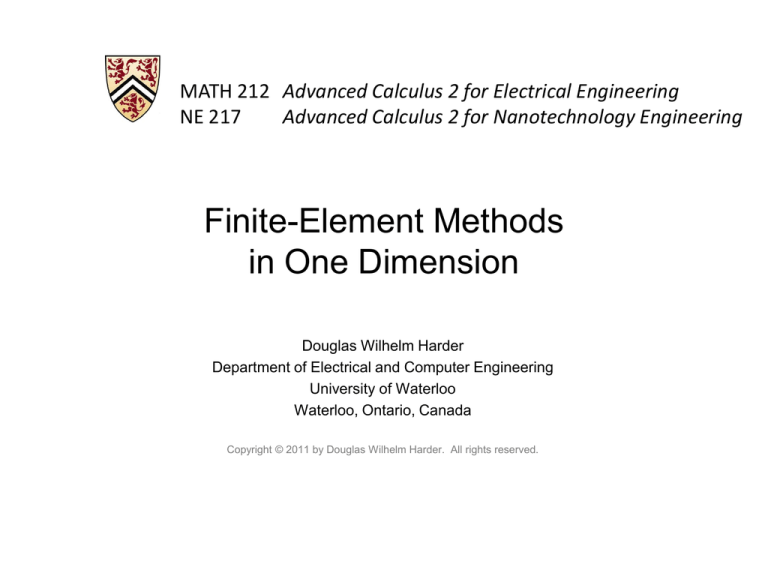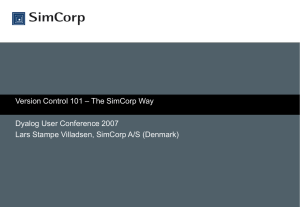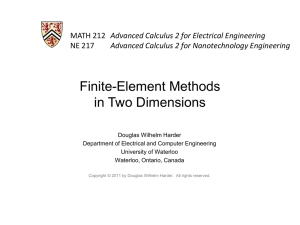
MATH 212 Advanced Calculus 2 for Electrical Engineering
Advanced Calculus 2 for Nanotechnology Engineering
NE 217
Finite-Element Methods
in One Dimension
Douglas Wilhelm Harder
Department of Electrical and Computer Engineering
University of Waterloo
Waterloo, Ontario, Canada
Copyright © 2011 by Douglas Wilhelm Harder. All rights reserved.
Finite-element Methods in One Dimension
Outline
This topic discusses an introduction to finite-element methods
– Background
– Justification
– Uniform test functions
• On equally spaced points
• On unequally spaced points
2
Finite-element Methods in One Dimension
Outcomes Based Learning Objectives
By the end of this laboratory, you will:
– The concept of a test function
– How we can approximate Laplace’s equation on unequally spaced
points
3
Finite-element Methods in One Dimension
Background
The most significant problem with finite differences:
– Seldom does nature line up on a grid
In 1d, finite differences form equally spaced points on a line:
We need to be able to move the points around so that:
– The points will match the geometry of the actual shape, and
– We can add more points in areas of interest
4
Finite-element Methods in One Dimension
Justification
In higher dimensions, examples from mechanical engineering
quickly spring to mind:
– The crumple zones of a car
User:MrMambo
5
Finite-element Methods in One Dimension
Justification
However, we may need this flexibility even in one dimension
– Consider heat diffusion along a rod containing three regions
• Copper
• A transition from copper to aluminium
• Aluminium
The points do not even line up with the transitions in the materials
6
Finite-element Methods in One Dimension
Justification
We could add more points:
Now we are solving a system of 41 equations and unknowns…
7
Finite-element Methods in One Dimension
Justification
What we really want:
– More points close to and in the transition
Such a system is much simpler than the previous idea…
8
Finite-element Methods in One Dimension
Test Functions
We will look at a solution that produces the same result as finite
differences; however, we will be able to generalize it
– The generalization can be extended to higher dimensions, too
9
Finite-element Methods in One Dimension
Test Functions
Starting with the equally spaced intervals, define a point a piecewise
constant test function for each interval:
1 x1 x x3
0 otherwise
2 x
10
Finite-element Methods in One Dimension
Test Functions
Starting with the equally spaced intervals, define a point a piecewise
constant test function for each interval:
1 x2 x x4
0 otherwise
3 x
11
Finite-element Methods in One Dimension
The Unknown Solution
We know the solution passes through unknown points with the
constraints:
u(a) = ua = u1
u(b) = ub = u2
12
Finite-element Methods in One Dimension
Piecewise Linear Approximations
We will approximation the solution through piecewise linear
functions:
u1 x u1
x x2
x x1
u2
x1 x2
x2 x1
13
Finite-element Methods in One Dimension
Piecewise Linear Approximations
We will approximation the solution through piecewise linear
functions:
u1 x u1
x x2
x x1
u2
x1 x2
x2 x1
1
At x1: u1 x1 u1
0
x1 x2
x x
u2 1 1 u1
x1 x2
x2 x1
14
Finite-element Methods in One Dimension
Piecewise Linear Approximations
We will approximation the solution through piecewise linear
functions:
u1 x u1
x x2
x x1
u2
x1 x2
x2 x1
0
At x2: u1 x2 u1
1
x2 x2
x x
u2 2 1 u2
x1 x2
x2 x1
15
Finite-element Methods in One Dimension
Piecewise Linear Approximations
We can write a similar piecewise-linear on each interval
u2 x u 2
x x3
x x2
u3
x2 x3
x3 x2
16
Finite-element Methods in One Dimension
The Target Equation
Next, we have Laplace’s equation in one dimension:
d2
u x 0
2
dx
Define:
def
d2
V x 2 u x
dx
we have the equation
V x 0
17
Finite-element Methods in One Dimension
The Integral
If V x 0 , it follows that
x V x 0
for any test function (x) and therefore
b
x V x dx 0
a
d2
In this case, however, we defined V x
u x and thus
2
dx
def
d2
a x dx2 u x dx 0
b
18
Finite-element Methods in One Dimension
The Integral
Consider the first test function 1(x) :
3
d2
d2
a 1 x dx 2 u x dx x dx 2 u x dx 0
1
b
x
19
Finite-element Methods in One Dimension
The Integral
If, however, we approximate u(x) on that interval by the piecewise
constant function
x x3
x x2
x x1
x x2
u1 x u1
u2
u2 x u 2
u3
x1 x2
x2 x1
x2 x3
x3 x2
d2
d2
u x 2 u2 x 0
we already have that
2 1
dx
dx
We get no additional information!
20
Finite-element Methods in One Dimension
The System of Linear Equations
Thus, we approximate the function u(x) by
x x1
x x2
u
u
2
1 x x
x2 x1
1 2
x x2
x x3
u3
u2
x3 x2
u x u x x2 x3
x xn
x xn 1
u
u
n
n 1 x x
xn xn 1
n 1
n
def
where we define uk x uk
x1 x x2
x2 x x3
xn 1 x xn
x xk 1
x xk
uk 1
on xk x xk 1
xk xk 1
xk 1 xk
21
Finite-element Methods in One Dimension
Integration by Parts
However, take
d2
x
u
x
a dx2 dx 0
and performing integration by parts, we have
b
b
d
d
d
x
u
x
x
u
x
dx 0
dx
a a dx
dx
b
d
d
d
d
b u x a u x x u x dx 0
dx
dx
dx
dx
a
x b
x a
b
22
Finite-element Methods in One Dimension
Integration by Parts
First, substituting in the first test function:
b
d2
x
u
x
a 2 d 2 x dx 0
x x1 x x3
which yields
x3
1
1
d
d
d
d
x
u
x
x
u
x
x
u
x
dx 0
2
2 3
2 1
dx
dx
dx
dx
x1
x x3
x x1
23
Finite-element Methods in One Dimension
Integration by Parts
Now, given
x
3
d
d
d
u
x
u
x
x
x
x
x
u
x
1
3
dx 0
dx
dx
dx
x1
x x3
x x1
substitute our approximation:
x3
d
d
d
u
x
u
x
x
x
x
x
u
x
1
3
dx 0
dx
dx
dx
x1
x x3
x x1
Remember that on the interval of interest,
x x2
u1
u2
u1 x x1 x x2 x1 x2
u x
u
x
x
x
x
2 2
3
u x x3 u
3
2 x2 x3
x x1
x2 x1
x1 x x2
x x2
x3 x2
x2 x x3
24
Finite-element Methods in One Dimension
Integration by Parts
Differentiating and substituting in the two approximations yields
u3 u2
u2 u1
2
2
0
x3 x2
x2 x1
but as the denominators are equal (equal width intervals), this
simplifies to
u3 2u2 u1 0
This is the exact same linear equation we got from Laplace’s
equation using finite differences
25
Finite-element Methods in One Dimension
The System of Linear Equations
If we were to repeat this at each interval, we would have:
2
1
1
2
1
1
2
1
1
2
1
1
2
1
1
2
1
u2 ua
u 0
3
u4 0
u
0
5
u6 0
1 u7 0
2
u8 ub
9k
k 1
This has the regular solution uk
ua
ub
8
8
which is a straight line…
26
Finite-element Methods in One Dimension
Unequally Spaced Points
What this tells us, however, is that we have a method that can allow
us to use arbitrary sized intervals:
27
Finite-element Methods in One Dimension
The Test Functions
The most obvious generalization is to use similar test functions:
2 x
3 x
4 x
5 x
28
Finite-element Methods in One Dimension
The Equations
The most obvious generalization is to use similar test functions:
u3 u2 u2 u1
0
x3 x2 x2 x1
u4 u3 u3 u2
0
x4 x3 x3 x2
u5 u4 u4 u3
0
x5 x4 x4 x3
u6 u5 u5 u4
0
x6 x5 x5 x4
29
Finite-element Methods in One Dimension
The Equations
Assuming the width of the intervals are either h or 2h, we get:
u3 u2 u2 u1
0
x3 x2 x2 x1
u4 u3 u3 u2
0
x4 x3 x3 x2
u5 u4 u4 u3
0
x5 x4 x4 x3
u6 u5 u5 u4
0
x6 x5 x5 x4
u3 u2
h
u4 u3
h
u5 u4
2h
u6 u5
2h
u2 u1
2h
u u
3 2
h
u u
4 3
h
u u
5 4
2h
0
0
0
0
30
Finite-element Methods in One Dimension
The Equations
Multiply by h:
u3 u2
h
u4 u3
h
u5 u4
2h
u6 u5
2h
u2 u1
2h
u u
3 2
h
u u
4 3
h
u u
5 4
2h
0
u3 u2 12 u2 12 u1 0
0
0
u4 u3 u3 u2 0
1
2
1
2
u5 12 u4 u4 u3 0
u6 12 u5 12 u5 12 u4 0
0
31
Finite-element Methods in One Dimension
The Equations
This gives us the system of linear equations
1.5 1
u2 0.5u1
u 0
1
2
1
3
1 1.5 0.5 u4 0
u
0.5
u
0.5
1
5
6
32
Finite-element Methods in One Dimension
The Equations
Solving this yields points on a straight line
3u1 u6
4
u2 5u 3u
1
6
8
u3
u4 u1 u6
2
u5
u 3u
6
1
4
1
4
3
8
1
2
3
4
33
Finite-element Methods in One Dimension
Summary
We have looked an alternate approach to approximating solutions to
partial differential equations
–
–
–
–
Used test functions
Used integration by parts
The result gave us a system of linear equations
The solution was an approximation
• In this case, with Laplace’s equation in one dimension, it was exact
34
Finite-element Methods in One Dimension
What’s Next?
We will next consider
– Replacing Laplace’s equation with Poisson’s equation
– Use non-uniform test functions
• Tent functions
35
Finite-element Methods in One Dimension
References
[1] Glyn James, Advanced Modern Engineering Mathematics, 4th Ed.,
Prentice Hall, 2011, §§9.2-3.
36
Finite-element Methods in One Dimension
Usage Notes
•
•
These slides are made publicly available on the web for anyone to use
If you choose to use them, or a part thereof, for a course at another
institution, I ask only three things:
– that you inform me that you are using the slides,
– that you acknowledge my work, and
– that you alert me of any mistakes which I made or changes which you make, and
allow me the option of incorporating such changes (with an acknowledgment) in
my set of slides
Sincerely,
Douglas Wilhelm Harder, MMath
dwharder@alumni.uwaterloo.ca
37










